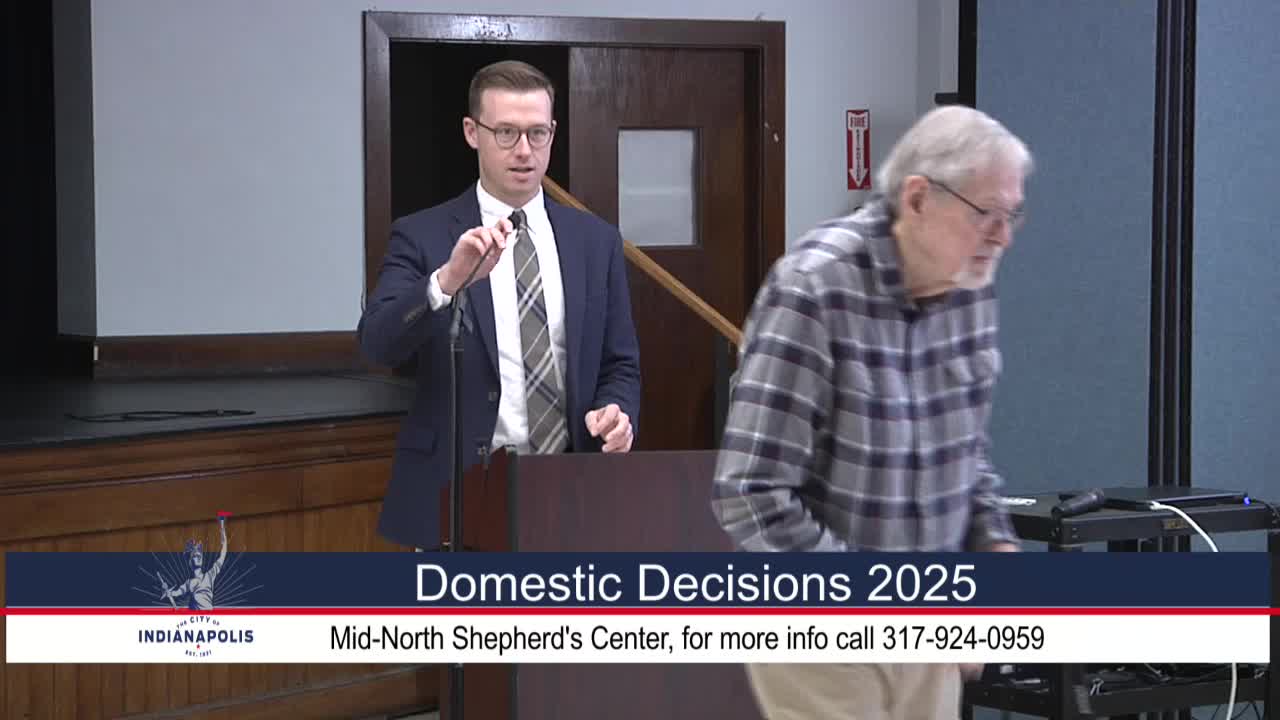ACLU attorney: recent state laws and federal pressure threaten academic freedom at U.S. universities
Get AI-powered insights, summaries, and transcripts
Subscribe
Summary
An ACLU attorney told a Bloomington audience that state statutes and federal enforcement actions are narrowing protected speech on campuses, citing historical Supreme Court rulings and recent cases including ACLU litigation in Indiana and federal demands against major universities.
An ACLU attorney said Wednesday that recent state laws and federal enforcement actions are eroding free-speech protections and academic freedom at public and private universities across the United States, and cited local Indiana incidents and ongoing litigation as examples.
The speaker, identified in the event introduction as an attorney with the American Civil Liberties Union, told an audience at Indiana University–Bloomington that courts have long recognized broad First Amendment protections on campus and for faculty, and that current state and federal measures risk undoing that legal firewall. "If it's protected, we defend it," he said of the ACLU's approach to defending faculty and students regardless of politics.
The attorney reviewed key Supreme Court precedents that courts rely on in campus speech disputes, including Sweezy v. New Hampshire (1957), Keyishian v. Board of Regents (1967), Healy v. James (1972) and Papish v. Board of Curators of the University of Missouri (1973). He said those cases establish that universities are "not enclaves immune from the sweep of the First Amendment" and that courts protect offensive as well as popular speech on campus.
On modern threats, the speaker cited state laws such as Florida's so-called "Stop Woke" measures and Indiana's SEA 202, saying the statutes can be written or applied in ways that condition tenure or discipline faculty for failing to "foster a culture of free inquiry, free expression, and intellectual diversity." He warned that vague bans on "endorsing" certain ideas could chill classroom methods used to prompt critical thinking.
He described campus protests after the Israel–Hamas hostilities and how some universities responded. At Indiana University, he said, administrators changed a policy late the night before a planned student encampment on Dunn Meadow, summoned state police, used snipers on nearby roofs and arrested about a dozen people; the ACLU has sued over the clearance and that case remains pending. He said similar federal pressure has followed protests at Columbia, Brown, UCLA and other institutions.
The speaker said the federal government has used Title VI of the Civil Rights Act and Title IX as leverage to pursue investigations and, in some cases, to threaten or pause research and funding. He cited recent outcomes he described as examples: Columbia University agreed to a settlement the presenter characterized as involving roughly $200 million plus an additional $21 million payment and the adoption of the International Holocaust Remembrance Alliance (IHRA) definition of antisemitism; Brown agreed to what the presenter described as a $50 million payment; the U.S. Department of Justice proposed a large payout demand at UCLA (the speaker said $1.2 billion was proposed); the University of Virginia agreed to reporting requirements and to eliminate certain diversity programs; Harvard challenged the federal action in court and won a permanent injunction, the speaker said.
Locally, the speaker described two ACLU actions: a recently filed lawsuit the ACLU said targets Ball State University and its president for firing a staff member over tweets about commentator Charlie Kirk, and a separate ACLU of Indiana lawsuit over Indiana State University's decision to bar work-study students from serving at the Terre Haute Pride Center. He also described an Indiana Daily Student episode in which a media-school advisor refused an administration directive limiting a special homecoming edition and was dismissed; the advisor has since sued, the presenter said.
The presenter advised audience members to understand their rights and to use legal tools to defend speech, saying institutions and individuals have sometimes "capitulated" under government pressure rather than litigate. He warned that conditioning public benefits or federal funds on viewpoint or speech content is a First Amendment problem and that immigration enforcement levers have also been used against protest leaders.
Audience members asked about comparative state free-speech rankings, the role of trustee appointments, and the practicalities of litigation; the speaker noted that the Foundation for Individual Rights in Education (FIRE) ranked Indiana University low on free-speech measures and that lawsuits are time-consuming and not every dismissed employee pursues litigation.
The attorney concluded by urging awareness of rights and legal remedies and invited further questions.
